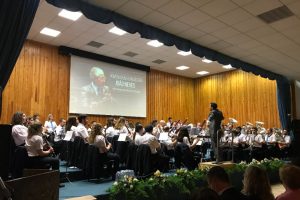De momento não existem eventos registados
Faleceu Alfred Reed
Clique na imagem para ver o tamanho original
Alfred Reed, um dos principais compositores para Banda do nosso tempo, faleceu no passado dia 17. A notícia do seu falecimento bem como uma resenha do seu brilhante percurso foi-nos remetida através da Newsletter da Molenaar, empresa Holandesa que comercializava as suas obras, através de um texto que reproduzimos na íntegra. Com a perda deste vulto da composição para Banda, reconhecido em todo o mundo, é impossível não sentir-mos um empobrecimento do panorama musical, não apenas filarmónico. Contudo, como foi já comentado no nosso FORUM de discussão, Alfred Reed nunca irá morrer, tal foi o valor do legado que nos deixou. ALFRED REED PASSED AWAY We regret to inform you that Alfred Reed died on the 17th of this month. A great man and, no doubt, one of the most important wind band music composers of the second half of the 20th century has passed away. All those who had the honor and pleasure to work with him, to play under his musical direction or simply to meet him will certainly keep a most pleasant memory of Alfred Reed. He was a great composer, he was a dynamic conductor, he was a fine teacher and was a most kind and sympathetic man. Alfred Reed was born in Manhattan, New-York on 25 January 1921 in a family of immigrants from Vienna. He inherited the love for music from his parents. At the age of eleven he started learning to play the trumpet and four years later also the piano. When he was fifteen years old, he played in a quintet performing five days a week in a restaurant and it was for this small ensemble that he wrote his very first composition, an arrangement of a medley of popular Irish folksongs. During the Second World War, Alfred joined the 529th Army Air Force Band in Denver, Colorado as a trumpeter and became really interest in concert band music. When he left the military band he had written over 100 compositions and arrangements. In 1944 he wrote his first significant composition Russian Christmas Music as part of a concert program at the request of composer Roy Harris. The piece, written in eleven days, was performed by a military band of 85 musicians from 5 different bands. Though it was only published some 25 years later, it soon became a very popular composition. After the war, Reed studied composition with Vittorio Giannini at the famous Julliard School of Music. In 1948 he started working as a composer and arranger for the NBC radio station and later for the ABC station, both in New-York. In 1953 he was appointed conductor of the Baylor Symphony Orchestra in Waco, Texas while completing his academic work. Two years later he became editor with the “Southern” music publishing firm. In 1966 he joined the faculty of the School of Music at the University of Miami in Florida where he taught music theory and composition until his retirement in 1993. He succeeded Frederick Fennell a conductor of the Miami University Wind Ensemble. Reed’s catalogue boasts some 250 published works for symphonic band, wind ensemble, orchestra, choirs and various chamber music groups. Besides his beautiful “Symphonies” and “Suites” for Band, works like El Camino Real and the unsurpassed Armenian Dances belong to the international standard classics of the original repertoire. Reed also wrote an impressive series of specialized articles on wind band music, especially as a contributor the magazine “The Instrumentalist”. Alfred Reed traveled all over the world as a goodwill ambassador for symphonic band music and was invited as a guest-conductor and an adjudicator in several continents. He was present and active at all major wind band events such as WASBE conferences, Mid-West Clinics, Mid-Europe conferences etc. But he had lost part of his heart in Japan. If Paul Yoder can be considered as the father of the modern band music in Japan, Alfred Reed is certainly the promoter of the immense development of wind band music in the land of the rising sun. Numerous recordings with his beautiful compositions, often performed under his musical direction, will remain a sounding testimony of this great composer. We offer our sincere condolences to Marjorie, who seconded and supported Alfred for so many years, and to the Reed family. We shall not forget that great man and his beautiful music. God Bless Alfred, his wife and family. Fonte: Molenaar Newsletter









